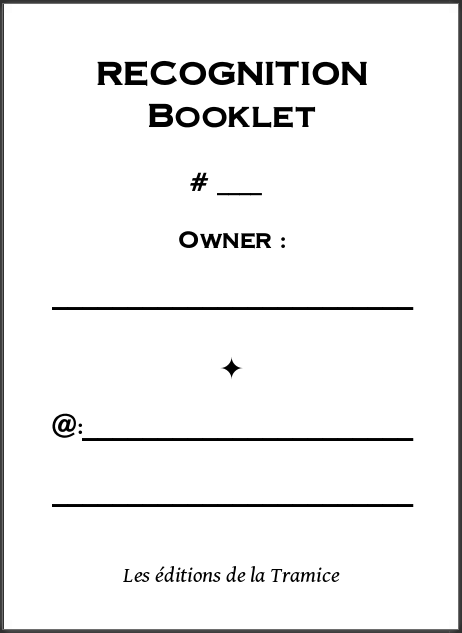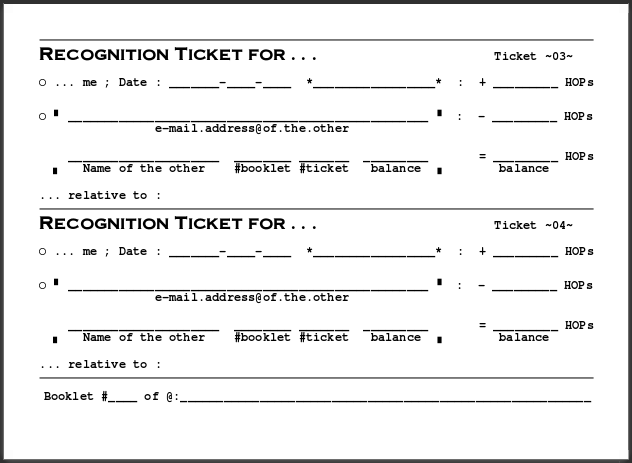✦

The Recognition Booklets
a tool to fluidify exchanges
✦
~ last revision : 2024-06-27 ~
Summary
Recognition booklets ― similar to those used in the JEU (jardin d’échange universel) — are a tool designed to facilitate exchanges through decentralized accounting, which will enable :
- to keep track of one’s « giving Vs. receiving » balance within the community
- to exchange accumulated HOPs (hours¹ of work per person) for goods or services with other booklets users
- to establish a currency (the HOP) based on transparency and peer supervision
- to start up projects more easily
1. A tiring hour’s work that requires an hour’s rest afterwards could, for example, be counted at up to 2 HOPs an hour. If no one wants to do a job, or if a task is eminently unpleasant but nevertheless necessary, we could go up to a rate of 3 HOPs per hour, or more. The hour is the unit, the basic measure ― against which to measure exceptions ! Some things that aren’t necessary are nonetheless priceless.
✦
Raison d’Être of the Recognition Booklets
Tip : Introduce the recognition booklets’ concept
to your guests by strategically placing one where it catches their eye while they wait in the living room. It serves as a gentle invitation to explore the idea !
Recognition booklets are designed to facilitate decentralized, inter-individual accounting, offering insights into your « giving Vs. receiving » balance within the community. They aim to streamline exchanges by replacing monetary transactions with a more holistic approach. Unlike money, which often exacerbates disparities, recording such balances costs nothing. Just as we don’t hesitate to use centimeters for various measurements throughout the day, keeping track of our exchanges in this manner aligns with a more balanced approach to community interactions.
What sets recognition booklets apart is their integration with The Fabric of Wishes, a mutual-assistance movement where individuals equip themselves with tools and practices for collective support. Through wishing circles and recognition booklets, we weave together our aspirations, offering support and acknowledgment to fellow members of our shared constellation.
Each local constellation directs its energies based on collective interests and investments. We prioritize actions aligned with our desires and aspirations, supporting and recognizing efforts accordingly.
This concept is easily replicable across localities and neighborhoods where people seek to foster interconnectedness and community support.
For more information and resources,
consult our toolbox !
LaTramice.net/The-Fabric-of-Wishes
✦
How the Booklets Work
Recognition booklets serve as a record of exchanges between participants, documented through recognition tickets. Exchanges are quantified in HOPs, representing hours of work per person.
For example, a particularly strenuous hour of work, necessitating an additional hour of rest, might be valued at 2 HOPs per hour. In situations where tasks are undesirable yet essential, rates could reach 3 HOPs per hour ― or higher. The universal hour serves as the foundational unit against which exceptions are evaluated. Some contributions, though not strictly necessary, hold immeasurable value.
To maintain the integrity of this measure system, please, refrain from using recognition booklets for loans, let alone with usurious intentions !
Each transaction that brings us below zero HOP implies a commitment to contribute back to the community. Ultimately, recognition booklets ensure a balanced exchange of giving and receiving over time. A consistently negative balance indicates imbalance, hindering the flow of energy within the community. Convertly, it is crucial for those hoarding them to utilize their HOPs effectively.
Participants can transact as they wish, by barter or volunteering, and, if they decide not to transact in HOPs, they can decide to still write it nonetheless in their recognition booklets with a symbolic zero HOP ― for the same reason that letters of recommendation were written in the past. However, it is « in one word » and in their own notebook, in the field between asterisks (*_____*), that participants are invited to give their appreciation of each exchange. Be imaginative !
Note that these entries, like any entry made in the booklets, will be, so to speak, public knowledge, since these notebooks will be intended to pass through several hands and photos may also be taken and circulated. So, think carefully about what you will write in them !
*
Such a culture of transparency is something that has been presented as undesirable and even dangerous by a society of centralized control. By focusing on transparency, control is automatically decentralized and more relaxed ― at least, one hopes so ― but still requires the « nonchalant supervision » of booklets and activities between peers. The mere fact that the booklets are thus open books during exchanges should discourage attempts at fraud.
We are also hereby embarking on activities that are not supervised by an all-seeing State, but between us and by us. Before embarking on an adventure, it is good to take precautions.
For example, you can ask someone for references if you don’t want to take a chance blindly ; ask for their phone number and call them ; come with someone to a first meeting ; tell someone in advance who you’re going to see — and report to the circle (or to someone who goes to the circle) any violence, theft or deception that you may have been a victim of.
*
You can keep a booklet for yourself, but also for each of your businesses. Indeed, it is healthy for a company with its own autonomy (desirability, promise of profitability) to have its own needs, its own promises, its own turnover ; its own life, in other words. A booklet can therefore be kept for a collective. We will then put the name of this collective on the cover page as well as an email address specific to this collective.
Whether it is for an individual or a collective booklet, or for one of our promising projects, a single booklet must be uniquely identified, that is to say with a complete email address and a sequential number — the first booklet being numbered 1, the second 2 and so on, as the booklets fill up.
Each booklet contains 64 recognition tickets, at a rate of 2 per page.
✦
Anatomy of a
Recognition Ticket
 Immediately below the words « Recognition Ticket for . . .« , there are two « radio buttons » (« ○« ) ; the first (opposite the word « me« ) must be checked if you are the person providing the good or service ; the second (opposite the box between » ▖ » beginning with the field titled « email.address@of.the.other« ) must be checked if you are the beneficiary. In both cases, the other person’s email address must be entered in this field.
Immediately below the words « Recognition Ticket for . . .« , there are two « radio buttons » (« ○« ) ; the first (opposite the word « me« ) must be checked if you are the person providing the good or service ; the second (opposite the box between » ▖ » beginning with the field titled « email.address@of.the.other« ) must be checked if you are the beneficiary. In both cases, the other person’s email address must be entered in this field.
Below this field, within the box, there is a field named « #booklet« . The number of the other person’s recognition booklet will be entered in this field ; and the ticket number in the booklet in which this other person records the transaction in the field named « #ticket« . (The ticket number in the booklet is located in the upper right corner of each ticket, between tildes « ~« .) On both sides, write the name of this person and the new balance of their booklet after calculation (see below).
Remember : your email address — or that of a collective for which you are responsible — must be written at the bottom of each page of tickets in each booklet.
The field marked « . . . relative to » is simply used to indicate the nature of the transaction. For example, if I am creating an recognition ticket to you for having received two hours of help from you in my garden, this field could contain, for example, « help in the garden » or « gardening ».
The field labeled « balance » is used to keep your current sum (or balance). A balance can very well be in the negative numbers, this is not a problem. However, in order to give to the community at least as much as we have received, we will want to try to keep, on average, a balance oscillating around zero. ― You can also very well refuse a transaction if you find that there is abuse. Or maybe help the other to regain some HOPs ?
Also enter the date on which the transaction is made in the field provided for this purpose. The format is YYYY-MM-DD (year-month-day).
The remaining fields are explained below.
✦
Accounting in its
Simplest Form
After an exchange (which you want to record, of course), if they are in presence of each other, each participant temporarily lends their booklet to the other so that we can take the opportunity to leaf through them ― and even take pictures if desired ―, then write down (or otherwise, remotely, in their own), in the next available ticket, all the data relating to the transaction.
Each participant then checks that everything has been correctly recorded in their booklet. In the event of a remote transaction ― if both parties agree, of course ―, you can send each other photos of your booklet pages ― the entire page, so that we can see, perhaps, other transactions, but especially : the email address written at the bottom of each page, unique to you or to one of your collectives in The Fabric of Wishes.
• If you provided the good or service, enter the amount of HOPs for the transaction in the field opposite, on the right, after the plus sign (« +« ).
• If you received the good or service, please instead enter the amount of HOPs for the transaction in the field opposite, on the right, after the minus sign (« –« ).
It will be up to each participant to calculate their new balance by adding or subtracting the amount of the transaction from their old balance (unless this is your very first recognition ticket, in which case we will calculate from zero), and to enter it in the field marked « balance« .
Remember : Always use a permanent ink pen to make entries in your booklet.
If you make a mistake on a ticket, cross it out with a big ✕, then start over on another ticket.
✦
Using the Booklet
for Collectives
Remember : You can also keep booklets for your collectives. Whether they are projects or well-established businesses or services in the community, it is good form to offer and ask for encouragement in HOPs and/or volunteering.
Write the name of the collective on the cover page of the booklet dedicated to it, then, under the email address of the collective, write your name as the person responsible (for the collective) ; otherwise proceed exactly as explained above for the accounting of recognition tickets, taking into account that the fields that will refer to your collective must contain an email address exclusive to it.
Talk about it to the wishing circles !
Our businesses also have their wishes.
~ Let’s encourage them ! ~
✦
The vitality of a community is measured
by the quantity and quality of its exchanges,
not by the sum of its bank accounts.
Moreover, the total sum of the balances
of all the booklets is always zero.
✦
Unlike money, which has become an instrument of excess, the HOP is conceived as a genuine measuring instrument, not for its precision (measurement is indicative, subjective and subject to negotiation), but for its conviviality.
The fact that this unit of exchange is associated with The Fabric of Wishes, a network of networks of people who take the time to meet (and network further !) ; the fact that it is transparent and therefore cross-verifiable by peers ; the fact that it is an individual tool, which does not depend on a central body, nor on variable exchange rates, but on a universal : time ― all this contributes to its reliability and its usefulness, and therefore to the confidence we can have in it.
✦
Any questions ?
Comments ?
You would like to order some booklets ?
Write to us !
✦
If you’d like to print your own booklets, here are the documents you’ll need. You’ll need to cut, fold and staple all the sheets in the right order. If you decide to print your own booklets, we’d love to hear from you ! (Editions@LaTramice.net)
- Cover (2 per sheet of carton paper, portrait, double-sided, flip over long edge)
- Presentation (portrait, double-sided, flip over long edge)
- Tickets (landscape, double-sided, flip over long edge)
*
Or order some via our boutique.
✦
~ Volios ~
~ Types of Wishes ~
Needs (of any nature : social, psychological,
physical, etc.), desires (deep or superficial), offers (of goods, services, talents, expertise, materials, time, help, space, transportation, etc.), exchanges (in money, HOPs, barter, etc.), gifts, sharing (of experiences, interests, knowledge, etc.), lending and borrowing (of tools, books, etc.), businesses (description, offers, needs ; e.g. : finding partners, etc.), activities (sports, literature, fun, dance, etc.), tours, trips (recommendations, itinerary, regularity, capacity to transport, search for means of transport), location (coordinates, radius of action), schedule, availability (for which specific activities or types of activity : physical, intellectual, etc.), languages (spoken, written, capacity to translate) . . .
✦
Concrete examples,
services at hand
✦ ~ ~ ~ ✦
• collection and refurbishment of furniture, dishes (. . .) left on the sidewalk or at the entrance to alleys (watch out for bedbugs !)
• meal preparation, collective kitchen . . .
• delivery, courier service :
– • by bike, on foot (. . .)
• gardening, watering, composting . . .
• DIY, renovations, carpentry . . .
• access to tools, workshops :
– • cabinetmaking, mechanics, tinkering . . .
– • programming, electronics . . .
• libraries, record collections . . .
• discussion circles, game nights . . .
• dishwashing, cleaning, babysitting . . .
• printing, publishing, writing . . .
• drawing, singing, sculpture . . . all the arts !
• et cætera
• . . .
Other good ideas ?
Send them to us !
✦ ✦ ✦
 ✦
✦
✦ The Fabric of Wishes ✦
✦
a mutual assistance movement
for individual and collective empowerment
Let’s organize wishing circles in our neighborhoods, write our volios (our wish lists ; needs, offers, interests, messages) — ours and those of our collectives) and distribute them intelligently among ourselves, as well as a letter inviting people to do the same — sample letter available here :
These practices, combined with the gratitude journals, have the potential to create an economic system based on collective intelligence, attention and kindness to create a world that resembles us.
So what would happen if we started
taking communication, networking, exchanging
and our dreams themselves — somewhat seriously ?
❂


